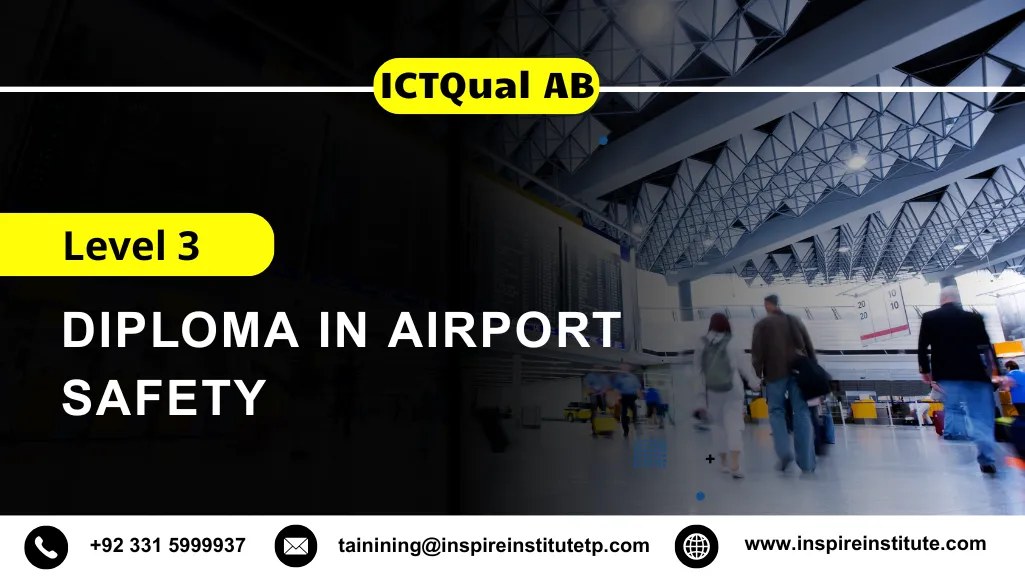ICTQual AB Level 3 Diploma in Airport Safety
The ICTQual AB Level 3 Diploma in Airport Safety is a foundational aviation safety qualification designed to equip learners with essential knowledge and skills for maintaining high standards of safety within airport environments. This internationally recognized airport safety course provides a strong entry point into the aviation industry, focusing on the critical aspects of safety management, operational procedures, and compliance with global aviation standards.
As airports continue to expand and passenger numbers grow worldwide, the demand for professionals trained in airport operations safety has never been greater. This diploma in airport safety prepares learners to understand and apply safety protocols, risk management strategies, and emergency response procedures that are vital to ensuring secure and efficient airport operations.
The program is ideal for individuals seeking an aviation safety career pathway, whether they are new entrants to the industry or professionals looking to strengthen their expertise. By completing this airport safety training program, learners gain practical insights into aviation safety regulations, hazard identification, and the importance of maintaining compliance with international standards.
Recognized globally, the ICTQual AB Level 3 Diploma serves as a stepping stone to advanced qualifications and career opportunities in aviation safety management. It empowers learners to contribute effectively to the safety culture of airports, airlines, and aviation authorities. With its emphasis on professional development and industry relevance, this aviation safety professional diploma is a valuable credential for anyone aspiring to build a career in the aviation sector.
Why Choose this Qualification
The ICTQual AB Level 3 Diploma in Airport Safety is designed to provide learners with essential knowledge and practical skills to ensure safe and efficient airport operations. This qualification is ideal for individuals starting their aviation journey or professionals seeking to strengthen their expertise in safety management. It offers international recognition, industry relevance, and clear career progression opportunities, making it a valuable credential for anyone aspiring to work in the aviation sector.
Global Recognition and Credibility
- Internationally respected airport safety qualification
- Recognized by aviation employers and regulatory authorities worldwide
- Enhances credibility in both local and global aviation markets
- Provides a competitive edge in recruitment and career advancement
- Serves as a benchmark for entry-level aviation safety education
- Strengthens professional reputation in the aviation industry
- Opens doors to opportunities across international aviation hubs
Practical Safety Skills Development
- Focuses on essential airport safety protocols and procedures
- Builds knowledge of hazard identification and risk management
- Provides training in emergency response and crisis handling
- Strengthens understanding of aviation safety regulations and compliance
- Develops skills for maintaining passenger and staff safety
- Offers practical insights into airport operations and safety culture
- Prepares learners for real-world aviation safety challenges
Career Advancement Opportunities
- Opens pathways to entry-level and supervisory roles in airport safety
- Increases employability in airlines, airports, and aviation authorities
- Supports progression into specialized safety and compliance positions
- Provides a foundation for consultancy and advisory roles in aviation safety
- Enhances opportunities for international career mobility
- Builds a strong base for lifelong learning in aviation safety management
- Strengthens prospects for leadership roles in safety departments
Industry-Relevant Curriculum
- Developed in consultation with aviation safety experts
- Reflects current global standards and best practices in airport safety
- Addresses emerging challenges such as sustainability and digitalization
- Includes modules on safety management systems and compliance frameworks
- Focuses on operational efficiency and passenger protection
- Ensures learners are prepared for industry demands and expectations
- Bridges academic learning with practical applications
Accessibility and Flexibility
- Designed for both new entrants and working professionals
- Offers flexible study modes to balance work and education
- Accessible to learners worldwide through international delivery partners
- Provides structured modules with clear progression routes
- Encourages independent learning and critical thinking
- Tailored to diverse learner needs and career goals
- Combines academic rigor with practical relevance
Pathway to Global Career Mobility
- Recognized across multiple aviation hubs worldwide
- Facilitates career progression in international airports and airlines
- Supports mobility into regulatory and compliance roles
- Provides transferable skills for cross-border aviation careers
- Strengthens global networking and professional connections
- Opens opportunities in consultancy, training, and safety management
- Builds confidence to work in diverse cultural and operational contexts
Course Overview
UK based Qualification
Study Units: 6 Units
Evidence & Assignment Based
Course Level: Level 3
Qualification Structure
This qualification, the ICTQual AB Level 3 Diploma in Airport Safety, consists of 6 mandatory units.
- Introduction to Airport Safety Principles
- Airside Operations and Hazard Management
- Landside Safety and Passenger Protection
- Emergency Response and Incident Procedures
- Aviation Safety Regulations and Compliance
- Operational Risk Assessment and Reporting
Who Should Take This Course
The ICTQual AB Level 3 Diploma in Airport Safety is designed for individuals who want to build a strong foundation in aviation safety and airport operations. Whether you are new to the industry or seeking to enhance your professional skills, this qualification provides the essential knowledge and practical expertise needed to succeed in aviation safety roles. Below are the groups of learners who will benefit most from this program.
Aspiring Aviation Professionals
- Individuals looking to start a career in the aviation industry
- Learners seeking entry-level qualifications in airport safety
- Those interested in building a foundation for future aviation roles
- Students aiming to gain practical knowledge of safety standards
- Career starters who want internationally recognized credentials
- Individuals motivated to join airlines, airports, or aviation authorities
- Learners preparing for long-term growth in aviation safety
Current Airport and Airline Staff
- Employees working in ground handling and airport operations
- Staff responsible for passenger safety and security procedures
- Team members seeking formal recognition of their safety skills
- Professionals aiming to strengthen compliance knowledge
- Individuals wanting to improve operational efficiency and safety awareness
- Staff preparing for supervisory or safety-focused roles
- Employees seeking career progression within aviation organizations
Safety and Security Personnel
- Professionals working in airport security and emergency response
- Individuals responsible for enforcing safety regulations and protocols
- Staff involved in risk management and hazard identification
- Personnel aiming to enhance crisis management skills
- Team members ensuring compliance with international aviation standards
- Safety officers seeking structured training and certification
- Security staff wanting to expand into broader aviation safety roles
Career Changers and International Learners
- Professionals from logistics, tourism, or transportation sectors entering aviation
- Individuals seeking to transition into airport safety roles
- Learners from diverse cultural and professional backgrounds
- Career changers aiming for globally recognized aviation qualifications
- International students preparing for aviation careers abroad
- Professionals relocating to aviation hubs worldwide
- Learners seeking transferable skills for cross-border aviation opportunities
Students and Graduates
- Recent graduates interested in aviation safety and operations
- Students seeking practical, industry-relevant training
- Learners aiming to strengthen employability in aviation markets
- Individuals preparing for advanced aviation qualifications in the future
- Graduates wanting to specialize in airport safety management
- Students motivated to gain international recognition early in their careers
- Ambitious learners seeking a competitive edge in aviation recruitment
Course Benefits
The ICTQual AB Level 3 Diploma in Airport Safety provides learners with essential skills, international recognition, and practical knowledge to succeed in aviation safety roles. This qualification is designed to strengthen employability, enhance professional credibility, and prepare learners for diverse opportunities in the global aviation industry. Below are the key benefits of completing this program.
Global Recognition
- Internationally respected airport safety qualification
- Recognized by airlines, airports, and aviation authorities worldwide
- Enhances credibility in both local and global aviation markets
- Provides a competitive edge in recruitment and career advancement
- Serves as a benchmark for entry-level aviation safety education
- Strengthens professional reputation in aviation safety and compliance
- Opens doors to opportunities across international aviation hubs
Career Advancement
- Prepares learners for entry-level and supervisory safety roles
- Increases employability in airlines, airports, and aviation organizations
- Supports progression into specialized safety and compliance positions
- Provides a foundation for consultancy and advisory roles in aviation safety
- Enhances opportunities for international career mobility
- Builds a strong base for lifelong learning in aviation safety management
- Strengthens prospects for leadership roles in safety departments
Practical Industry Relevance
- Curriculum developed with aviation safety experts and stakeholders
- Focuses on real-world airport safety challenges and solutions
- Includes case studies and applied learning opportunities
- Addresses compliance with international aviation safety standards
- Provides tools for hazard identification and risk management
- Strengthens knowledge of emergency response and crisis management
- Ensures learners are job-ready upon completion
Safety and Compliance Expertise
- Builds understanding of aviation safety regulations and frameworks
- Strengthens skills in monitoring and enforcing compliance
- Provides training in safety management systems (SMS)
- Enhances ability to identify and mitigate operational risks
- Develops expertise in passenger and staff safety protocols
- Prepares learners to handle audits and inspections effectively
- Empowers professionals to maintain a strong safety culture
Flexibility and Accessibility
- Designed for both new entrants and working professionals
- Offers flexible study modes to balance work and education
- Accessible to learners worldwide through international delivery partners
- Provides structured modules with clear progression routes
- Encourages independent learning and critical thinking
- Tailored to diverse learner needs and career goals
- Combines academic rigor with practical relevance
Networking and Global Opportunities
- Connects learners with aviation professionals worldwide
- Builds strong industry networks and collaborations
- Provides access to international aviation hubs and opportunities
- Strengthens global mobility and career transitions
- Encourages cross-cultural learning and professional exchange
- Opens opportunities in consultancy, training, and safety management
- Expands professional visibility in the aviation sector
Eligibility Criteria:
Age: Learners must be 18 years or older at the time of enrolment. Some centres may recommend learners to be 18+ if they are pursuing employment alongside study.
Educational Background:
No formal academic qualifications are required.However, a basic understanding of English, mathematics, and general science is recommended to support comprehension of safety procedures and operational terminology.
Work Experience:While not mandatory, prior experience in airport operations, ground handling, customer service, or security roles can enhance learning outcomes.Learners with exposure to airside or landside environments may find it easier to contextualise safety protocols and hazard management.
English Proficiency: Since the programme is delivered in English, learners should have functional written and spoken English skills. A level equivalent to CEFR B1 is recommended to ensure learners can engage with course materials, assessments, and discussions effectively.
Technical and Digital Requirements: Access to a computer or smart device with internet connectivity is required for blended or online delivery.Basic IT literacy is helpful for accessing course materials, submitting assignments, and participating in virtual safety briefings.
Physical and Operational Readiness:Learners should be physically capable of participating in practical safety exercises, emergency simulations, and operational walkthroughs.General awareness of airport layouts and basic aviation terminology is beneficial.
Future progression
Completing the ICTQual AB Level 3 Diploma in Airport Safety provides learners with a strong foundation to advance into diverse roles within the aviation industry. This qualification prepares individuals for career growth, specialization, and international opportunities in airport safety and operations. Below are the key progression routes available after achieving this diploma.
Entry-Level and Supervisory Roles
- Opportunities to work as airport safety assistants or coordinators
- Roles in ground handling and operational safety teams
- Supervisory positions overseeing passenger and staff safety protocols
- Employment in safety monitoring and compliance departments
- Positions supporting emergency response and crisis management units
- Roles assisting with hazard identification and risk assessments
- Opportunities to progress into team leadership roles in safety operations
Specialized Safety and Compliance Positions
- Careers in aviation safety inspection and auditing
- Roles focused on implementing safety management systems (SMS)
- Positions in airport security and regulatory compliance departments
- Specialization in risk management and hazard prevention strategies
- Opportunities in occupational health and safety within aviation environments
- Roles ensuring adherence to international aviation safety standards
- Positions supporting sustainability and environmental safety initiatives
Aviation Operations and Support Functions
- Employment in airport operations and ground services management
- Roles in passenger safety and customer service support
- Opportunities in cargo and logistics safety management
- Positions in ramp safety and aircraft handling supervision
- Roles assisting with operational efficiency and safety coordination
- Opportunities to contribute to airport safety training programs
- Positions supporting daily operational compliance and monitoring
Consultancy and Advisory Pathways
- Opportunities to assist aviation consultancy firms with safety projects
- Roles advising airports and airlines on safety improvements
- Positions supporting government or regulatory bodies in safety compliance
- Opportunities to contribute to safety audits and operational reviews
- Roles in advisory services for aviation training and development
- Positions offering guidance on emergency preparedness and response
- Opportunities to build expertise as a junior consultant in aviation safety
International Career Mobility
- Access to roles in airports across global aviation hubs
- Opportunities to work with international airlines and safety teams
- Positions supporting compliance with cross-border aviation regulations
- Roles in multinational aviation organizations and service providers
- Opportunities to strengthen cross-cultural safety management skills
- Employment in international consultancy and advisory services
- Positions offering exposure to diverse aviation environments worldwide
Lifelong Professional Development
- Pathways to advanced industry certifications in aviation safety
- Opportunities to attend workshops, seminars, and global aviation conferences
- Continuous skill development through specialized training programs
- Roles that encourage mentoring and supporting new aviation professionals
- Opportunities to contribute to aviation research and innovation projects
- Building expertise through participation in safety-focused industry networks
- Expanding influence through publications and thought leadership in aviation safety







